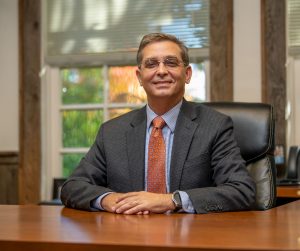GREENEVILLE – When Dr. Scott Hummel studied at The Hebrew University in Jerusalem, he had an opportunity to interact with fellow students from Jewish and Islamic faith traditions and those who held different political and cultural perspectives.

Dr. Scott Hummel
One element of his conversations that particularly caught his attention was their take on history.
“My Israeli friends described their history of the land very differently than did my Palestinian friends,” said Dr. Hummel, who now serves as Tusculum University’s president. “Even when retelling the very same events, they portrayed them very differently. It awoke in me a curiosity in exploring and evaluating the different ways history is represented and the different ways people tell their stories.”
Dr. Hummel shared that recollection as part of a lecture, titled “How History is Made,” Friday, Feb. 19, during the first of two presentations this month in Tusculum’s Theologian-In-Residence series. Speaking via the Zoom virtual platform, he talked about how organizations and people view what happens from diverse perspectives and through various lenses.
For example, he compared writing history to a trial in which a prosecutor and defense lawyer both use evidence to present different versions of the same incident.
“There is wisdom in the American justice system that requires jurors to listen to more than one version of an event to get to the truth,” Dr. Hummel said. “Each side uses the evidence with different agendas in mind. The jurors are more likely to discover the truth and whole story by critically evaluating both presentations. Whether evaluating recent history in media reports or ancient history, we are more likely to understand the past more fully when we listen to multiple perspectives.”
He noted that everyone, including historians, brings a bias, which is not necessarily bad but needs to be recognized and evaluated. He said the most challenging biases are the ones of which we are not aware.
When evaluating sources and evidence of the past we often place high value on eyewitness testimony and memories, but Dr. Hummel said memories can be faulty. He described a professor giving a university lecture in a large classroom filled with more than 100 students. During the lecture, someone ran across the front and grabbed the professor’s purse.
She said the group needed to report the incident to campus security, so she began to describe the thief in detail and then asked the class if it had anything to add to her recollection. The class confirmed her description and recalled the same details. It turned out she had planned this as a test and had given the wrong details. Because the students believed the professor and could visualize the false details she had given, she had influenced and altered their memories.
“She demonstrated that sometimes memory can be distorted and skewed and grow in time,” Dr. Hummel said. “Sometimes, when we have incomplete information, our minds try to make patterns and try to make sense of what we see, but they do not always do it accurately.”
Dr. Hummel distinguished between history as an event and history as an account of an event. He also urged against sanitizing history.
Transitioning from the general discussion of history to biblical history, Dr. Hummel noted that Judaism and Christianity are historical faiths in which their beliefs are grounded in historical events.
“In order to interpret the Bible well, we have to give a lot of attention to the historical narratives because they compose nearly half of the Old Testament and more than half of the New Testament,” he said. “Historical narratives are, therefore, a major form of revelation.”
When reading the historical narratives in the Bible, the reader needs to recognize the large differences between a modern and western context from the ancient and eastern mindset. Reading the Bible is a cross-cultural experience, he said.
Revelation through historical narrative carries many advantages. Stories draw people into the action, and readers can identify with the characters and the complex problems they face. Stories are much easier to remember and retell than other types of literature such as poetry, law or prophecy.
Dr. Hummel said the realism of biblical stories stands in sharp contrast to ancient history, which was more idealistic propaganda than history. The main biblical characters could be inspiring and flawed. David was a man “after God’s own heart,” but he was also an adulterer. Abraham was a man of faith and doubt. Solomon was wise and foolish. Joshua was courageous and afraid. When people give more time and attention to biblical stories, these stories become more relevant as their core lessons transcend time and culture.
Historical narratives subtly but effectively communicate values, so when the biblical stories were dominant in society, so were biblical values.
Dr. Hummel will return Friday, Feb. 26, for the second and final presentation of the Theologian-In-Residence series. The title of that talk is “Biblical Historiography.” The Zoom link is https://tusculum.zoom.us/j/84258243437?pwd=SnJJbFF6QVJ4RGxjeTM3VVg0SEw0dz09. The meeting ID is 842 5824 3437, and the passcode is 868525.
Theologian-In-Residence presentations are free, but Tusculum appreciates donations. To contribute, please visit www.tusculum.edu/giving or send a check by U.S. Mail to Tusculum University, Office of Institutional Advancement, P.O. Box 5040, Greeneville, TN, 37745. Donors can designate the gift to Theologian-In-Residence.
For more information, please call Nicole Rader, development officer and director of special events, at 423-636-0565 or email nrader@tusculum.edu.


